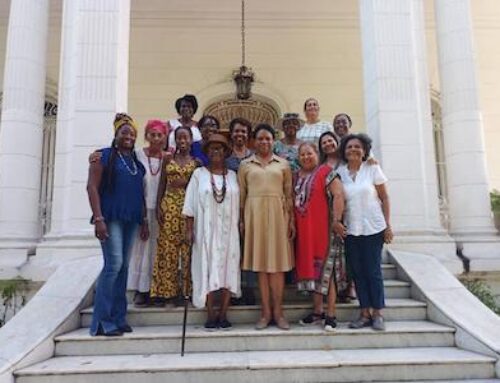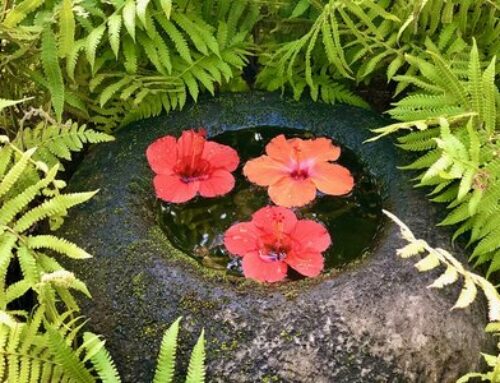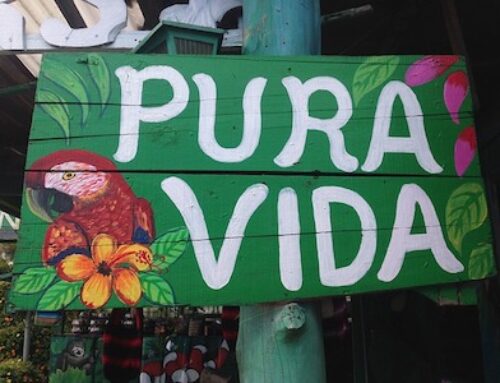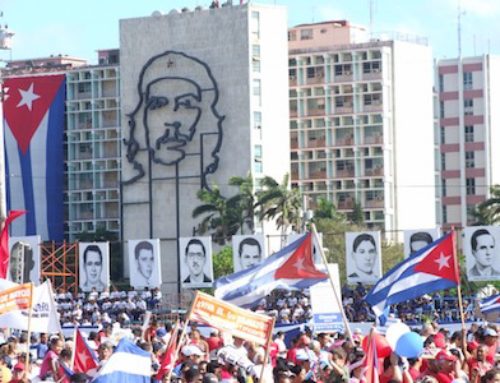New York-based Fleuretta “Flo” Waltrous leads international yoga, Pilates and fitness retreats for a predominantly black community of students. We spoke with her about her trips, which often interface with the history of the African Diaspora, and about why cultural exchange is so important for her community.
Hi Flo! How did you start leading international journeys?
I was studying and training for my 500-hour teacher training with Yoga Alliance, doing it with Shiva Rea. And she would travel all over the world and do trainings. I traveled and went to the most wonderful places—but I was the only black person! There would be 60-80 people and it would be just my daughter and myself who were black. So that’s how the framework started in my mind. I talked with Shiva and she offered me guidance. “Make the first one very inexpensive,” she said.
So I set up my first retreat in Brazil. I used a travel agent who’d been referred to me by a friend. Thank God there were only five people on that trip, because the agent defrauded us! The trip cost $2000 per person, and I put that all on my credit card. We did the trip, and it was wonderful, but it took a year for me to pay myself back.
After that: No more travel agents. I did everything myself: booked trips, reserved space—I learned how to do everything. We went to Curacao, Panama, Cuba, Dominica.
I connected with Malia when she was with Global Exchange, because they did our first Cuba trip for us. Then Malia did our second Cuba trip, to Santiago/Old Habana, after she’d started AltruVistas. Then together, we went to Southeast Asia: Thailand, Cambodia, Laos. Then to Australia; and most recently, to Cartagena, Colombia.
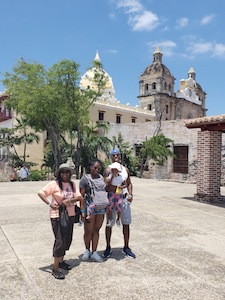
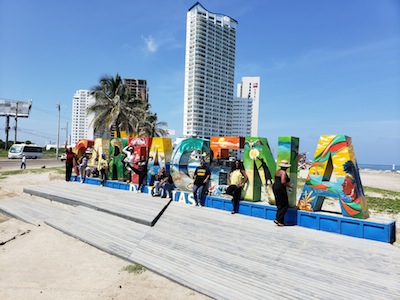
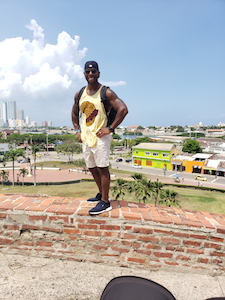
You often travel to places whose history is part of the African Diaspora. Can you talk more about this?
Yes. Many of the countries we visit have some nexus to black people being brought from Africa. I research and specifically look for some type of African nexus so that we can go and learn from each other, and understand one another’s struggles. When we travel, we’re able to see how resilient the elders were in keeping and passing on the African traditions. For example, a lot of the enslaved Africans in Cartagena were from Congo. When we saw them dance, there was a lot of movement in the hips like in Congolese dancing.
On our Colombia trip, we also visited Palenque. We had to go, because of the history. Malia had made an arrangement for one of the elders to teach us; to lecture on the history. I do a lot of research to prepare for my trips—so some of what he said I’d known before we left stateside, but there was also some information I didn’t know. Others in my group didn’t know the history at all, and were there as blank pages. Just to see them listening, to hear their questions, to see the excitement—it was wonderful to watch.
We went to our guide’s house for a cooking class. We cooked in the yard the same way my elders did in Barbados, grating the coconut with the grater, pounding with the mortar and pestle, the same thing. When I traveled to Senegal, I saw that too—food is prepared the same way that my elders from Barbados prepared it.
In Palenque, we had the best lunch. Everyone got their own huge fried tilapia. It was delicious. We were eating together; engaging with the people. They were stunned to see how we could dance with the drums—surprised to see how the music is not really foreign to us. So when we travel, we’re able to see the similarities; the cultural frameworks—both ways. The surprise goes both ways at the similarities. It’s heartening.
It was also important for us to observe Palenque in comparison to Cartagena. In Palenque, there were no sidewalks, just red dirt. It reminded me of neighborhoods in New York that aren’t yet gentrified. No matter where you are in the world, the money doesn’t go to black neighborhoods.
We also went to La Boquilla, and the people there were talking with us about racism: They have a bad reputation, and tourists don’t want to come to their neighborhood. Child, please. We went right there, had a jewelry-making class, listened to their stories, danced together…. They were so happy we were there. We were so happy to be there, to buy their T-shirts and give them money. You do what you can to effectuate change.
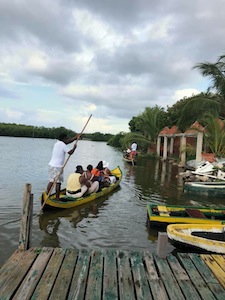
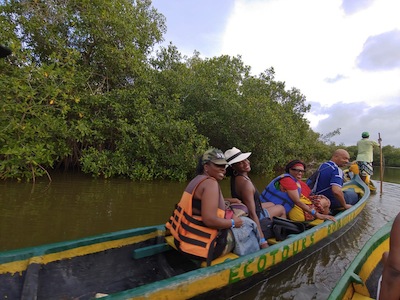
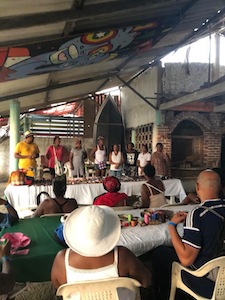
What makes your retreats unique?
We travel to break stereotypes about black people. We want to effect change in how people view our community. We’re a yoga and Pilates group that just happens to be Afro-Caribbean. However, anyone and everyone is welcome to join us! Everybody can come on the retreat. Even though we are a majority black group, I have students from Russia, Ireland, Asia…. It’s a matter of who wants to come.
My retreats are also different from many others in the yoga world because I don’t enforce a lot of restrictions. I don’t say, “You can’t watch TV, eat meat, dance, drink.” Everybody’s an adult—they have to come to their own truth, at the time they decide to come to it. If you join us, you don’t have to take the yoga—you don’t have to take anything. My retreats are free will. People have brought their mothers; their spouses. Just let me know where you are.
I also give people almost a year to pay—my retreats always have a payment plan of eight months to one year. Everything we do is included. Everything. Once you get there, you barely need money.
When we go on the retreats my students who are in training as teachers lead some of the classes. I co-teach or observe. When I’m teaching, the students who are in training assist me with adjustments. The requirements I give them are more than Yoga Alliance requires. I train teachers one-on-one: It’s not like a teacher training where there are 40 people in the room. One-on-one is the way teachers were trained historically. I only have one or two trainees at a time. I want to make sure they’re really taking care of people.
My whole family goes on the retreats: my daughter, my son (in law), my two grandbabies. This last retreat we did fitness and yoga. My son is into fitness; he has a military background and does “boot camp.” From now on, all the retreats will offer both fitness and yoga.
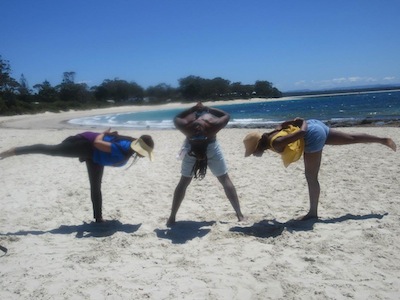
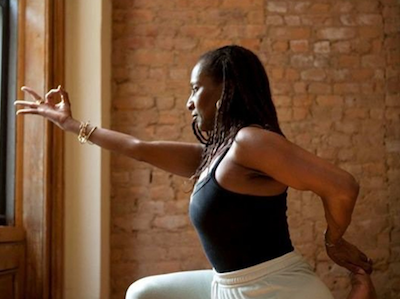
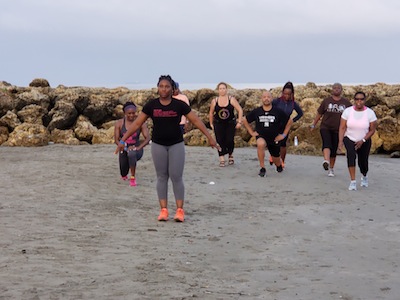
What’s the history of “Flo’s Body Shop,” and the evolution of your work as a teacher?
Flo’s Body Shop is based in Brooklyn and affiliated with two different gyms, and I also go around and do privates. Twenty years ago, I started teaching in a gym in an Italian neighborhood. But I came to realize that in my community, there was nobody teaching yoga or Pilates. I was asked to come to a different gym, a Bally’s in the Flatbush area, and after my daughter went away to college I had the bandwidth, so I started teaching there as well.
Except for really young people, I was the only one teaching in the black community at that time, trying to spearhead the movement. Boy oh boy was it difficult trying to teach these black people that yoga was not the devil’s workshop! I grew up Christian. Everything I do is guided by God, for God. In my practice, and my life, not only did I delve deep into yoga philosophy, but deeper into Christianity. I was able to engage with church people in a conversation that bridges the two belief systems. Twenty-plus years later, what I’m offering has been embraced.
We don’t do chanting. There’s no kirtan. It’s more important for me to get people into the room; get them hooked on the asanas. The philosophy of yoga is ultimately identical to most religions: It’s about ethics, and about the body as a temple. When I started, it was a big old room, and there were two people in class. And there would only be two because I would go outside and drag somebody in! Now I have 40 or 50.
I’ve since gone to a second gym in East Flatbush, and built up a practice there from four students to 30. Everything is in divine order.
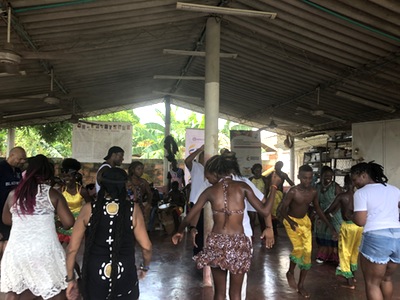
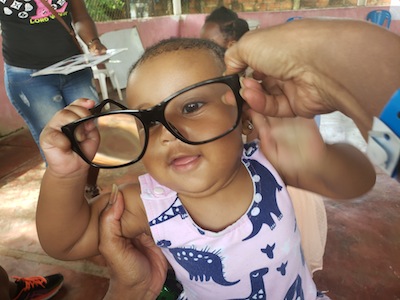
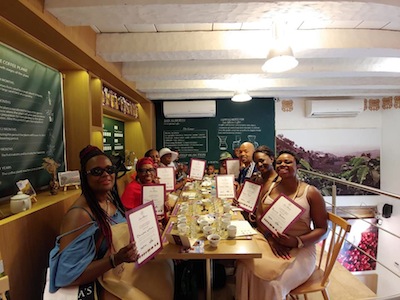
How do you see travel transforming your students and your community?
I’ve been able be at the forefront of cultural exchange and to share that with my students. I was going to Cuba pre-Obama, but legally; I went to Cuba three times before taking my students. My first Cuba trip was around 20 people. I was so happy Malia joined us on our Colombia trip, because we share a deep understanding of the importance of making cross-cultural connections—and we both like to have fun doing it! Malia and I are stuck at the hip. She doesn’t know it, but we are. She’s part of the family.
When the students come back, there’s always this excitement. The people who didn’t come are so excited, wanting to see the pictures, hear the stories. Everyone’s practice is reinvigorated.
To connect more with Flo or get on her mailing list for future travel:
Flo Body’s shop website
For upcoming AltruVistas journeys that also explore the African Diaspora and the impact of the Atlantic Slave trade, see below.
Cuba
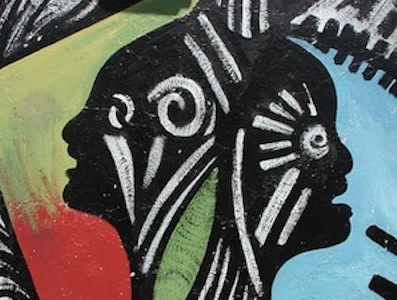
Nov. 15-25
$3810 doubles in hotel | single supplement $750
$2910 doubles in casas particulares | single supplement $350
Sponsoring Organization: AAREA
Availability: OPEN
Colombia
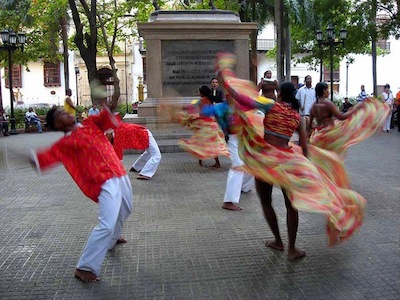
March 10-18, 2019
$2,915–$3,495 double occupancy based on # of participants
single supplement $450
includes a $200 tax deductible donation to ECPAT-USA
Sponsoring Organization: Greater Good Institute
Availability: OPEN

